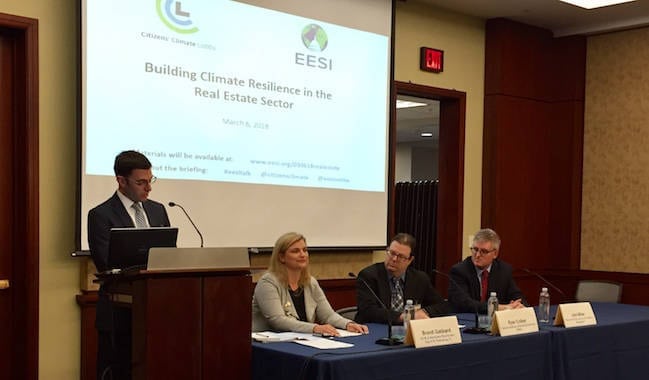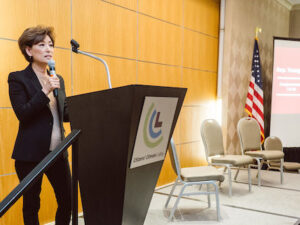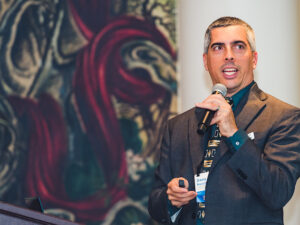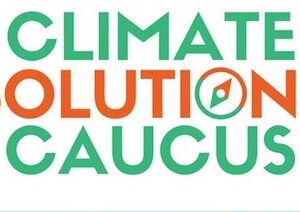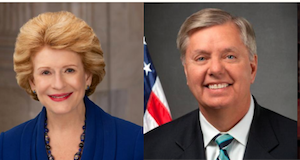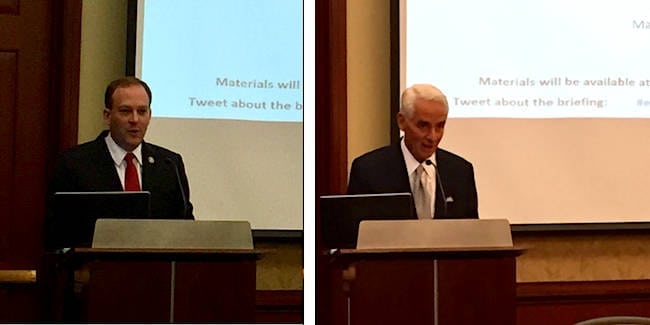
Rep. Lee Zeldin (R-NY) and Rep. Charlie Crist (D-FL) co-hosted a briefing on climate change and real estate
Reps. Zeldin & Crist host climate & real estate briefing with CCL, EESI
By Jehivian Hernandez
On March 6, Citizens’ Climate Lobby and the Environmental and Energy Study Institute (EESI) hosted a briefing at Capitol Hill titled “Building Climate Resilience in the Real Estate Sector.” This discussion forms part of a broader dialogue around the country, after witnessing the devastation caused by the 2017 hurricane season, on how to mitigate the effects of future extreme weather events on homes, businesses, and other built infrastructure. As a bipartisan effort to move forward a serious discussion in Congress concerning climate change, the event was co-sponsored by two members of the House Climate Solution Caucus, Republican Rep. Lee Zeldin of New York and Democratic Rep. Charlie Crist of Florida.
“This event was an excellent opportunity to join forces with other organizations and move forward a serious discussion regarding the devastating consequences of climate change,” said Andres Jimenez, CCL Senior Director of Government Affairs. “We look forward to continuing to work with other organizations in the coming months, and to keep advocating for effective, practical policy solutions against the threats of climate change in our country.”
Bipartisan congressional hosts
Given that both Rep. Zeldin and Rep. Crist are from coastal districts, they expressed the real threats that their constituencies and the rest of the nation face by the dramatic changes in climate, mainly by sea levels rising and disastrous hurricanes.
“As a Floridian, we see the power of our hurricanes increase every year exponentially […], and it’s inevitable that this is going to continue,” Rep. Crist commented in his initial remarks while arguing the importance of these dialogues to better understand how to confront these issues.
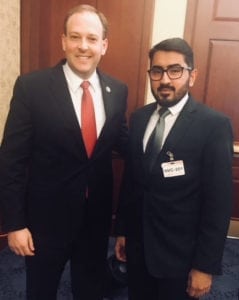
Rep. Zeldin and CCL Fellow Jehivian Hernandez
Rep. Zeldin argued that “coastal resiliency is incredibly important for homes, for business, [and] for local governments,” giving the alarming example of Fire Island, New York, where with one single storm countless homes, including his own, could end up hundreds of feet from the ocean.
Zeldin also praised the hard work and dedication of CCL and all the other organizations participating in the briefing. He recognized the effectiveness of our approach to each member’s office on the Hill and of our bipartisan efforts to build common ground. “The bipartisan Climate Solution Caucus would not have been created and would have not grown to the number it now is at, without the way that these organizations approach members on the Hill and ensure that Republicans and Democrats are both coming to the table,” Zeldin said.
Experts weigh in
The panel at last week’s briefing included:
- Brandi Gabbard, the newly elected City Council member in St. Petersburg, Florida, and chairwoman of the National Association of Realtors Insurance Committee
- Ryan Colker, the vice president of the National Institute of Building Sciences
- Jon Miller, the legislative committee chairman for the New Jersey Association for Floodplain Management
The panelists weighed in on mitigation efforts to confront the risks of drastic climate change, and how Congress, the federal government, and the private sector could invest to fund and coordinate these new efforts.
The first panelist, Gabbard, addressed the growing worries of constituents in coastal communities, specifically concerning investing in real estate during environmental crises. The major concerns are the inability to afford to insure against these risks and the lack of access to mitigation resources. Likewise, the absence of a comprehensive budget plan for high-risk scenarios and the unwillingness to invest in infrastructure upgrades puts these coastal communities at risk of being uninhabitable by 2100.
Therefore, Gabbard said, “Congress can help by quantifying and understanding the cost of inaction; providing communities and property owners with access to mitigation financing options; investing in more reliable risk mapping technology and infrastructure needs; and supporting national and private insurance options and flexibility.”
Also, Ryan Colker argued for the investment in mitigation efforts. Reports from the Federal Emergency Management Agency found that through federal grants, for every USD 1.00 invested, USD 4.00 would be saved. In an expanded study, NIBS found that for every USD 1.00 spent, USD 6.00 would be saved. Likewise, Colker advocated for a public-private incentivization for pre-disaster resilience, saying, “The most cost-effective manner to achieve resilience is through a holistic and integrated set of public, private and hybrid incentivization programs including mortgages, insurance, fiancé, tax incentives and credits, and grants.”
Miller, after reviewing the destruction caused by hurricane Sandy in 2012, advocated for more efficient management for the usage of land. He emphatically argued, “We don’t have a flood problem — we have a land-use problem.” He said this is crucially accentuated by the fact that “we have built in areas that are high risk, and [now] we’re paying the price for that.”
Joining the other panelists, Miller expressed the urgency for an upgrade in the policies at the federal and local level to accommodate future changes, and that this must be done with the involvement of the private sector.
For a full recap of the hosts and panelists’ remarks, and to access the panelists’ presentation slides, visit EESI’s website.
Jehivian Hernandez holds a Bachelor of Arts in Political Science from the University of Puerto Rico and a Master of Science in Latin American Politics from University College London. He is based in CCL’s D.C. office and is the first recipient of the CCL Diversity Fellowship.

